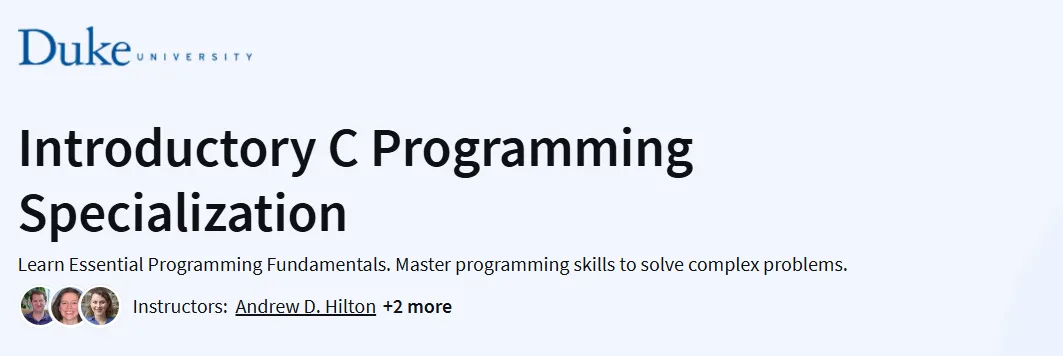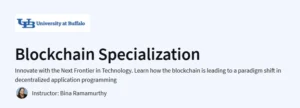What you will learn in Introductory C Programming Specialization
-
Master fundamental programming concepts using the C language, including variables, control structures, functions, and memory management.
-
Develop algorithms systematically and implement them in C to solve complex problems.
-
Gain proficiency in debugging and testing C programs to ensure reliability and efficiency.
-
Apply learned concepts through hands-on projects, such as creating sorting algorithms and simulating poker hand probabilities using Monte Carlo methods.
Program Overview
Programming Fundamentals
⏳ 18 hours
- Introduction to programming concepts and problem-solving techniques using C. Learn the Seven Steps approach to solving programming problems and develop a strong foundation in algorithm development.
Writing, Running, and Fixing Code in C
⏳ 20 hours
- Delve into writing C code, compiling programs, and debugging. Understand how to read and interpret error messages, and learn strategies to fix common programming issues.
Pointers, Arrays, and Recursion
⏳ 25 hours
- Explore advanced topics in C programming, including pointers, arrays, and recursive functions. Learn how to manipulate memory and understand the intricacies of data structures.
Interacting with the System and Managing Memory
⏳ 25 hours
- Understand how C programs interact with the operating system. Learn about dynamic memory allocation, file I/O, and system calls to build more complex and efficient programs.
Get certificate
Job Outlook
-
Completing this specialization prepares you for roles such as Software Developer, Systems Programmer, or Embedded Systems Engineer.
-
The skills acquired are applicable across various industries that utilize C programming for system-level and application development.
-
Enhance your employability by gaining practical experience in C programming and problem-solving.
Explore More Learning Paths
Take your programming and computer science expertise to the next level with these hand-picked programs designed to expand your skills and strengthen your coding fundamentals.
Related Courses
-
The Arduino Platform and C Programming Course – Learn how to program Arduino devices using C, combining hardware and software skills for hands-on projects.
-
Object-Oriented Programming in Java Course – Master Java programming with a focus on object-oriented design, a critical skill for building scalable applications.
Related Reading
-
What Is Python Used For – Gain insight into the versatility of Python and how it compares to C and Java in different programming contexts.
Specification: Introductory C Programming Specialization Course
|
FAQs
- Yes, the course is designed for complete beginners.
- It introduces concepts step by step with practical examples.
- No prior coding knowledge is assumed.
- C teaches low-level concepts like memory management, which are hidden in high-level languages.
- Learning C builds a strong foundation for understanding how computers actually work.
- Knowledge of C can make learning other languages easier later.
- You’ll be able to implement algorithms and problem-solving programs.
- Projects may include simulations, sorting algorithms, and file-handling programs.
- The skills translate well into embedded systems, operating systems, and performance-critical software.
- Expect to spend 6–8 hours per week to stay on track.
- The specialization has multiple modules requiring consistent practice.
- Hands-on coding and debugging exercises will take the most time.
- Yes, C is still widely used in embedded systems, operating systems, and high-performance applications.
- Employers value candidates who understand core programming concepts deeply.
- This specialization can be a stepping stone toward roles like software developer, systems programmer, or embedded engineer.





